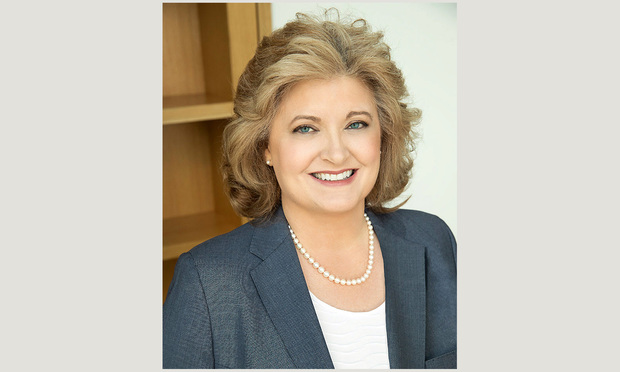New COVID-19 Reality, How to Swear in a Deposition Witness, Notarize a Document Remotely
The many ways Texas lawyers practice law has undergone swift and dramatic change thanks to widespread shelter-in-place orders we are all soldiering…
April 21, 2020 at 11:26 AM
7 minute read
 Meloney Perry is the founding partner of the Dallas office of Perry Law P.C.
Meloney Perry is the founding partner of the Dallas office of Perry Law P.C.
The many ways Texas lawyers practice law has undergone swift and dramatic change thanks to widespread shelter-in-place orders we are all soldiering through. Videoconference hearings are starting to feel routine, and even the U.S. Supreme Court is set to hear oral arguments telephonically for the first time in its history.
Some of the essential nuts and bolts of our civil justice system are also having to adapt, and here the logistical details get a little tricky. Processing documents and obtaining deposition testimony are critically important components governed by strict protocol, and technology and the law are racing to keep up with the remote-working requirements created by the COVID-19 pandemic. While technology that enables Remote Online Notarization ("RON") and Remote Online/video conference Depositions is quickly being adopted on a state-by-state basis, important considerations such as whether a notary must be physically present or whether a witness can be sworn in remotely are in need of clarity. Practitioners are wise to proceed with caution.
Remote Online Notarization ("RON")
During the RON process, a notary often is not physically present and, in some cases, not even in the same state. According to the National Association of Secretaries of State's website, 23 states — including Texas — currently allow RON, while another 21 have taken emergency action to permit use of the technology.
Texas has allowed RON since July 2018 for certain types of documents, although the statute is silent on whether Texas would approve of RON when a notary is in a different state than the witness.
It is up to individual attorneys to confirm that the RON process they are using meets the standards and regulations — including security and confidentiality requirements — set forth in the Texas Government Code and the Texas Administrative Code. As an option, third-party companies offer RON so that attorneys do not have to locate a remote online notary on their own. Importantly, the online notary must meet specific criteria and is not the same as a standard notary public. See Tex. Gov't Code Ann. § 406.105.
In addition, an April 9 executive order by Gov. Greg Abbott temporarily suspended certain statutes concerning appearances before a notary to execute a self-proved will, a durable power of attorney, a medical power of attorney, a directive to a physician, or an oath of an executor, administrator, or guardian. Under the order, these types of documents may now be notarized via videoconference.
In lieu of a notary, many attorneys are using Texas Civil Practice & Remedies Code §132.001 Unsworn Declarations, which requires additional Information than the standard declaration such as a person's name, date of birth, address, country, county, state and the date signed.
State-by-State Patchwork
While states generally recognize the doctrine of interstate recognition of notarial acts, the application of that principle is often inconsistent. There appears to be tension between interstate recognition of a document from a sister state that has been prepared, signed and notarized per a remote online notary approved by the sister state and intrastate recognition of a document within a state where the signer is physically located in the forum state and signed the document by using an out-of-state remote online notary.
When a document is notarized by a remote out-of-state notary, the first step is to identity whether the state in which you are trying to use the document and where the signer is located allows remote notary services. To confuse the process even further is the fact that while many states have authorized the use of RON during the pandemic, there are inconsistencies in interpretation of what is needed for RON.
Congress recognizes there is no universal rule regarding RON. U.S. Senators Mark Warner, D-VA, and Kevin Cramer, R-ND, introduced the "Securing and Enabling Commerce Using Remote and Electronic Notarization Act of 2020" that would authorize remote online notarizations nationwide. Senate Bill 3533 would "establish minimum standards for electronic and remote notarizations that occur in or affect interstate commerce, to require any Federal court located in a State to recognize notarizations performed by a notary public commissioned by another State when the notarization occurs in or affects interstate commerce, and to require any State to recognize notarizations performed by a notary public commissioned by another State when the notarization occurs in or affects interstate commerce or when the notarization was performed under or relates to a public act, record, or judicial proceeding of the State in which the notary public was commissioned." See https://www.congress.gov/bill/116th-congress/senate-bill/3533
Remote Online Depositions
Online depositions in Texas are not new and have been approved since January 1999. However, contrary to shelter-in-place best practices, the Texas Rules of Civil Procedure requires in-person swearing in of witnesses. Tex. R. Civ. P. 199.1 Remote depositions currently envisioned due to the pandemic have the court reporter in a separate location from the witness and no one present physically with the witness to administer the oath.
On March 13, the Texas Supreme Court entered an emergency order addressing certain issues, including remote testimony and depositions. The order provides in part that the courts may "[a]llow or require anyone involved in any hearing, deposition, or other proceeding of any kind—including but not limited to a party, attorney, witness, or court reporter, but not including a juror—to participate remotely, such as by teleconferencing, videoconferencing, or other means" and courts may " [c]onsider as evidence sworn statements made out of court or sworn testimony given remotely, out of court, such as by teleconferencing, videoconferencing, or other means." See https://www.txcourts.gov/media/1446056/209042.pdf This order suggests that the court reporter could appear remotely and not be physically located with the witness or taker of the deposition.
Meanwhile, emergency orders issued by several other states explicitly allow an oath to be taken remotely via video conference. For example, on March 18, Florida's Supreme Court entered an emergency order suspending in-person swearing-in requirements "so long as the notary or other qualified person can both see and hear the witness via audio-video communications equipment for purposes of readily identifying the witness" See https://www.floridasupremecourt.org/content/download/632105/7182680/AOSC20-16.pdf.
Another example is the Massachusetts Supreme Judicial Court's March 20 temporary provision that provides:
…an officer or other person before whom the deposition is to be taken is hereby authorized by the court to administer oaths and take testimony without being in the presence of the deponent, so long as the officer or other person before whom the deposition is to be taken can both see and hear the deponent via audio-video communication equipment or technology for purposes of positively identifying the deponent.
The legal industry has taken giant steps to adapt to the workplace challenges created by the COVID-19 pandemic. Even though many of these changes are allowable only because of emergency orders, it is very likely that the acceptance of remote notary services and depositions without on-site swearing in are here to stay, at least in some form. This is new territory for most Texas lawyers; needless to say, it is advisable to proceed with caution and contact your malpractice carrier before proceeding.
Meloney Perry is the founding partner of the Dallas office of Perry Law P.C. She is the immediate past Chair of the State Bar of Texas Insurance Law Section. Her practice focuses on insurance coverage, bad-faith and class action litigation in multiple jurisdictions including Texas, Colorado and New Mexico. For more information about the firm, visit www.mperrylaw.com.
This content has been archived. It is available through our partners, LexisNexis® and Bloomberg Law.
To view this content, please continue to their sites.
Not a Lexis Subscriber?
Subscribe Now
Not a Bloomberg Law Subscriber?
Subscribe Now
NOT FOR REPRINT
© 2025 ALM Global, LLC, All Rights Reserved. Request academic re-use from www.copyright.com. All other uses, submit a request to [email protected]. For more information visit Asset & Logo Licensing.
You Might Like
View All
Haynes and Boone Expands in New York With 7-Lawyer Seward & Kissel Fund Finance, Securitization Team
3 minute read
'None of Us Like It': How Expedited Summer Associate Recruiting Affects Law Students and the Firms Hiring Them

Big Law Firms Sheppard Mullin, Morgan Lewis and Baker Botts Add Partners in Houston
5 minute read
Trending Stories
- 1Munger, Gibson Dunn Billed $63 Million to Snap in 2024
- 2January Petitions Press High Court on Guns, Birth Certificate Sex Classifications
- 3'A Waste of Your Time': Practice Tips From Judges in the Oakland Federal Courthouse
- 4Judge Extends Tom Girardi's Time in Prison Medical Facility to Feb. 20
- 5Supreme Court Denies Trump's Request to Pause Pending Environmental Cases
Who Got The Work
J. Brugh Lower of Gibbons has entered an appearance for industrial equipment supplier Devco Corporation in a pending trademark infringement lawsuit. The suit, accusing the defendant of selling knock-off Graco products, was filed Dec. 18 in New Jersey District Court by Rivkin Radler on behalf of Graco Inc. and Graco Minnesota. The case, assigned to U.S. District Judge Zahid N. Quraishi, is 3:24-cv-11294, Graco Inc. et al v. Devco Corporation.
Who Got The Work
Rebecca Maller-Stein and Kent A. Yalowitz of Arnold & Porter Kaye Scholer have entered their appearances for Hanaco Venture Capital and its executives, Lior Prosor and David Frankel, in a pending securities lawsuit. The action, filed on Dec. 24 in New York Southern District Court by Zell, Aron & Co. on behalf of Goldeneye Advisors, accuses the defendants of negligently and fraudulently managing the plaintiff's $1 million investment. The case, assigned to U.S. District Judge Vernon S. Broderick, is 1:24-cv-09918, Goldeneye Advisors, LLC v. Hanaco Venture Capital, Ltd. et al.
Who Got The Work
Attorneys from A&O Shearman has stepped in as defense counsel for Toronto-Dominion Bank and other defendants in a pending securities class action. The suit, filed Dec. 11 in New York Southern District Court by Bleichmar Fonti & Auld, accuses the defendants of concealing the bank's 'pervasive' deficiencies in regards to its compliance with the Bank Secrecy Act and the quality of its anti-money laundering controls. The case, assigned to U.S. District Judge Arun Subramanian, is 1:24-cv-09445, Gonzalez v. The Toronto-Dominion Bank et al.
Who Got The Work
Crown Castle International, a Pennsylvania company providing shared communications infrastructure, has turned to Luke D. Wolf of Gordon Rees Scully Mansukhani to fend off a pending breach-of-contract lawsuit. The court action, filed Nov. 25 in Michigan Eastern District Court by Hooper Hathaway PC on behalf of The Town Residences LLC, accuses Crown Castle of failing to transfer approximately $30,000 in utility payments from T-Mobile in breach of a roof-top lease and assignment agreement. The case, assigned to U.S. District Judge Susan K. Declercq, is 2:24-cv-13131, The Town Residences LLC v. T-Mobile US, Inc. et al.
Who Got The Work
Wilfred P. Coronato and Daniel M. Schwartz of McCarter & English have stepped in as defense counsel to Electrolux Home Products Inc. in a pending product liability lawsuit. The court action, filed Nov. 26 in New York Eastern District Court by Poulos Lopiccolo PC and Nagel Rice LLP on behalf of David Stern, alleges that the defendant's refrigerators’ drawers and shelving repeatedly break and fall apart within months after purchase. The case, assigned to U.S. District Judge Joan M. Azrack, is 2:24-cv-08204, Stern v. Electrolux Home Products, Inc.
Featured Firms
Law Offices of Gary Martin Hays & Associates, P.C.
(470) 294-1674
Law Offices of Mark E. Salomone
(857) 444-6468
Smith & Hassler
(713) 739-1250






